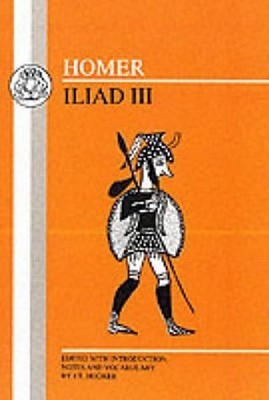TL;DR
Book III of The Iliad focuses on the duel between Paris and Menelaus, showcasing themes of honor, cowardice, and divine intervention as Paris seeks to win back Helen with the help of Aphrodite.

Get full Book
What is The Iliad, Book III about
In Book III of The Iliad, Homer presents a pivotal moment in the Trojan War where Paris and Menelaus engage in single combat to settle their dispute over Helen, the cause of the conflict. The narrative explores themes of bravery, honor, and the influence of the gods. Hector, Paris's brother, draws attention to Paris's cowardice and pushes him to accept the challenge, ultimately leading to the duel that will determine the fate of Helen and the war's outcome. This book highlights not just the human emotions involved but also the divine intervention when Aphrodite saves Paris from defeat, emphasizing the interplay of fate and free will in the epics of ancient Greece.
The Iliad, Book III 5 Key Takeaways
The Challenge Issued
Hector confronts Paris for his cowardice, urging him to face Menelaus in combat. This challenge serves as a catalyst for the duel that symbolizes the larger conflict between the Greeks and Trojans.
The Duel Begins
Paris and Menelaus step forward to duel, representing their respective sides in the war. The stakes are high as they fight for Helen, encapsulating the personal and political dimensions of their battle.
Divine Intervention
As Menelaus gains the upper hand in the duel, Aphrodite intervenes to save Paris from certain death, illustrating the gods' influence over mortal affairs and the unpredictability of war.
The Outcome
With Paris rescued by Aphrodite, the duel ends without a clear victor, which prolongs the conflict and highlights the theme of unresolved issues in human relationships.
The Role of Honor
The events reveal the significance of honor and reputation in ancient Greek culture, as both warriors fight not just for Helen, but for their own legacies.
Top The Iliad, Book III Quotes
- "Let the gods decide who will win, for they are more powerful than men."
- "With honor at stake, I will not shy away from the challenge before me."
- "Fate is a fickle friend; we are but players on its grand stage."
Who should read The Iliad, Book III?
This book appeals to readers interested in classic literature, mythology, and the human condition as portrayed through epic narratives. Readers will find insight into themes of honor, conflict, and divine influence, enriching their understanding of ancient Greek culture and its relevance to modern life.
The Iliad, Book III Best Reviews
- "Homer's work in The Iliad continues to resonate through time, and Book III is a masterful illustration of his narrative skill and understanding of human nature." - Classical Literature Review
- "Hooker's edition of The Iliad brings a fresh perspective to an ancient text, making it accessible and engaging for modern readers." - The Literary Times
People also liked these summaries
The Iliad, Book III FAQs
What is the main conflict in Book III of The Iliad?
The main conflict centers around the duel between Paris and Menelaus, which is a direct result of their rivalry for Helen, instigating the larger Trojan War.
What role does Hector play in Book III?
Hector acts as a voice of reason and honor, chastising his brother Paris for his cowardice and encouraging him to face Menelaus in a duel.
How does divine intervention affect the outcome of the duel?
Aphrodite intervenes during the duel, saving Paris from being killed by Menelaus, which adds complexity to the themes of fate and the influence of the gods on human affairs.